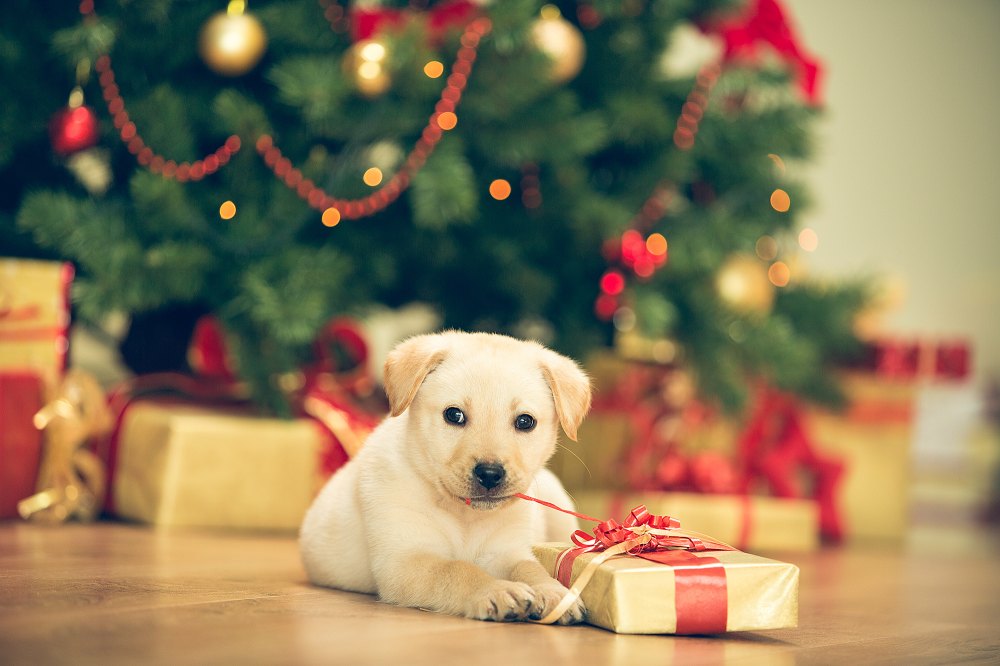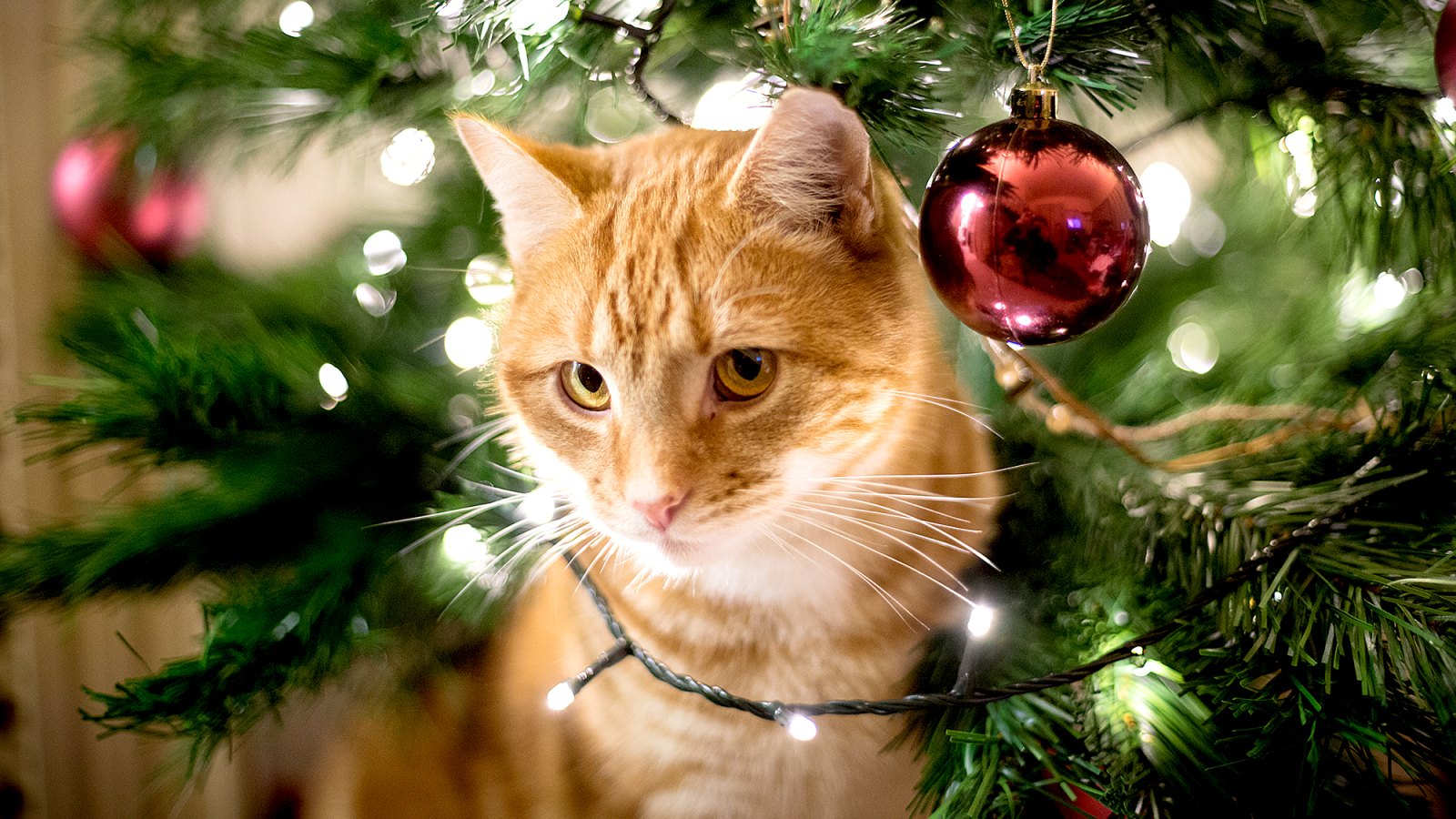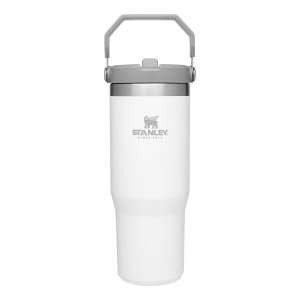Deck the halls with boughs of holly … are you sure about that?
Mistletoe, lilies, rosemary, and holly berries are all toxic when ingested by animals, so you ought to think twice before spreading all that holiday cheer around your house.
Tinsel, ribbons, and electric tree lights also pose threats to cats and dogs this time of year — especially the ones who like to nibble on things they shouldn’t — so Us Weekly asked Dr. Gary Richter, a veterinary health expert at Rover, for a full run down of all the hazards our four-legged friends may face this season.
Tinsel and ribbons can spell trouble for pets.
If you have a beloved fur kid, you’ve gotta ditch these two things, plain and simple. “Two of the most egregious holiday offenders are the dreaded tinsel and ribbons,” says Richter. “There’s really no way around it—you’ve got to forego tinsel and ribbons if you have pets.”
Both cats and dogs may try to eat these stringy objects, Richter says, and ingestion can result in fatal “foreign body” gastrointestinal obstructions. “These long pieces of string can easily get tied up, tangled, and caught in a pet’s digestive tract and cause major havoc until they are surgically removed. Trust me, it’s not worth it,” he adds.
Decking the halls can be dangerous.
As mentioned above, mistletoe, lilies, rosemary, and holly berries are all toxic when eaten by animals and can lead to toxicity poisoning. “I suggest going with other safer plants,” says Richter. For a list of which common household plants are toxic and non-toxic, visit the ASPCA’s website.
Keep glass ornaments out of reach of those playful paws.
Glass ornaments are not long for this world, especially when there’s a cat around! Keep kitty safe by hanging them high or buying shatterproof ornaments instead. “If you have a fragile ornament that might get batted off the tree, I recommend hanging it as high as possible to keep it out of reach,” says Richter. “This won’t only protect your ornament, but your cat as well: shattered ornaments can easily cause lacerations if your pet tries to ingest them.”

Know that your Christmas tree can cause an upset tummy.
Steer clear of Christmas tree sap, Richter says, it’s a serious gastrointestinal irritant for dogs and cats. “Ingestion can occur either from the sap that collects on the needles of the tree, or from the water at the base of the tree which absorbs much of this sap over the course of a day,” he explains. “If you have a tree, you may want to consider keeping your pet out of the room that it is in. Tree water may also contain high levels of bacteria and fertilizers, both of which can cause gastrointestinal upsets.”
Holiday lights can lead to electric shock.
If you’re the Clark Griswold of holiday displays, know that your kitty or doggy could get into trouble when you’re not looking. “If you have cats or a pet whom you know to chew on wires, you’ll want to put some effort into hanging these wires out of range of your cat or dog,” Richter says. “It is always a good idea to turn these lights off at night. If your cat starts to chew on a live wire and gets through the protection, they may suffer from electric shock.”
Drooling, general disorientation and impairment are common symptoms of shock. “If your pet begins presenting with such symptoms it is always a good idea to call your veterinarian, and, in the meantime, have someone check to make sure none of your wires have been chewed on,” he adds.
Don’t invite pets to the holiday party (sorry).
We hate to be a party pooper, but there are just too many things that can happen if you do. Someone could accidentally let your pet out an entrance or exit, or feed them a poisonous food — grapes, nuts and alcohol are just a few human favorites that can make pets sick (the ASPCA has a full list). Additionally, if your pet is free roaming while you’re getting festive (and not paying attention), they could potentially put their nose somewhere they shouldn’t.
“It’s good to make sure your medications are safely locked away as pets may be extra on-edge with company around and willing to go digging for things to eat,” Richter says. “Additionally, and maybe more importantly, remind your guests to keep any medications on their person (or in a purse/bag) safely away from pets.”
Instead of extending an invitation, create a safe space for your pet where they can safely chill and be separated from children who may not know how to safely interact with them. “[Choose] a separate room or area, stocked with your pet’s favorite treats, food and/or toys, where your pet will feel safe and comfortable despite the tumult of a larger gathering,” he explains. “This can be especially helpful if your pet is sensitive to loud noises.”
Walking in a winter wonderland can be treacherous.
Pets need extra protection during the cold weather months, especially on walks. “The combination of cold weather and road salt can be very drying and damaging to pads,” says Richter, who recommends footwear or paw wax as protection for dogs. “Also remember that antifreeze is highly toxic to dogs and (unfortunately) tastes good. Make sure to keep pets away from antifreeze.”
It’s also wise to keep an eye on pets during a cold front, no matter their level of enthusiasm for going outside. “Some dogs love the winter and playing in the snow. The great news is that dogs are well designed for cold weather which is why they tend not to get frostbite like people do,” he says. “Older dogs however may be at greater risk for aches and pains related to the cold. They may also be more prone to slip and injure themselves on icy surfaces. Be careful with older or less physically sturdy dogs.”


